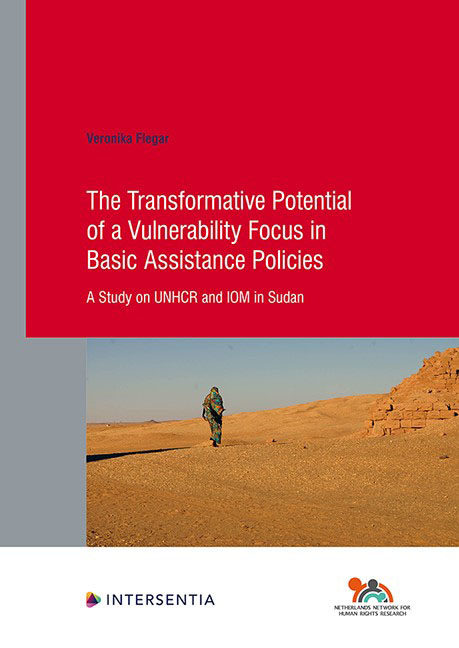 The Transformative Potential of a Vulnerability Focus in Basic Assistance Policies
The Transformative Potential of a Vulnerability Focus in Basic Assistance Policies Book contents
- Frontmatter
- Dedication
- Preface and Acknowledgements
- Contents
- List of Abbreviations
- List of Tables
- List of Figures
- Chapter 1 Introduction
- PART I NORMATIVE AND EMPIRICAL THEORY
- PART II BACKGROUND TO THE CASE STUDIES
- PART III CASE 1: ASSESSING AND ADDRESSING VULNERABILITY AT UNHCR KHARTOUM
- PART IV CASE 2: ASSESSING AND ADDRESSING VULNERABILITY AT IOM KHARTOUM
- PART V
- Bibliography
- Samenvatting
- Summary
- About the Author
- Human Rights Research Series
Chapter 6 - Background on UNHCR in Sudan
Published online by Cambridge University Press: 11 November 2021
- Frontmatter
- Dedication
- Preface and Acknowledgements
- Contents
- List of Abbreviations
- List of Tables
- List of Figures
- Chapter 1 Introduction
- PART I NORMATIVE AND EMPIRICAL THEORY
- PART II BACKGROUND TO THE CASE STUDIES
- PART III CASE 1: ASSESSING AND ADDRESSING VULNERABILITY AT UNHCR KHARTOUM
- PART IV CASE 2: ASSESSING AND ADDRESSING VULNERABILITY AT IOM KHARTOUM
- PART V
- Bibliography
- Samenvatting
- Summary
- About the Author
- Human Rights Research Series
Summary
This short introductory chapter provides background information on UNHCR in Sudan at the time of research so as to facilitate the reader's understanding of the particularities of the specific case investigated in this study. The chapter outlines UNHCR's operation in Sudan at the time of research (6.1), UNHCR's policy of cash-based interventions central to this case study (6.2) and the policy process underlying the vulnerability assessment design and implementation for these cash-based interventions at UNHCR Khartoum (6.3).
UNHCR OPERATION IN SUDAN
SIZE AND STRUCTURE OF THE OPERATION
At the beginning of the field research, in November 2017, UNHCR Sudan's operation was the 8th-largest UNHCR operation worldwide with 331 employees. This staffwas spread over 12 offices (Khartoum, Kosti, Kadugli, El Fula, Kassala, Girba, Gedaref, El Geneina, Nyala, El Fasher, Zalengei, Ed Daien). The office in Khartoum constituted the main office with approximately 100 employees (including drivers) while all other offices were field offices (and therefore much smaller in size). The present study focused exclusively on the main office in Khartoum. The Khartoum office was subdivided into six major units: Programme, Protection, Finance, Human Resources, External Relations and Supply. The Programme and Protection units were the most directly relevant units for the vulnerability-focused basic assistance policy investigated in this case study.
KEY PRIORITIES AND BUDGET OF UNHCR IN SUDAN
According to a UNHCR document, registration and documentation, camp management and coordination and basic services were identified as “[l]ife-saving protection and assistance services which will be strengthened and prioritised in 2017”. Other official foci included attention to trafficking along the lines of the inter-agency “Strategy to Address Human Trafficking, Kidnappings and Smuggling of Persons in Sudan” and the encouragement of refugees’ economic self-reliance.
In 2017, the expenditure of UNHCR Sudan was US$ 90.062.679 while the total funds available were US$ 84.837.824. Of this expenditure, the largest amount (US$ 83.952.941 was spent on refugee programmes (compared to about US$ 6.6 million on IDPs and US$ 1 million on statelessness). Of the money available for refugee programmes, the largest amount (US$ 42 million) was spent on basic needs and essential services. Of this expenditure on basic needs and essential services, the largest amount (US$ 10.5 million) was spent on non-food items while, most relevant for this study, US$ 1.6 million was spent on services for persons with specific needs.
Information
- Type
- Chapter
- Information
- The Transformative Potential of a Vulnerability Focus in Basic Assistance PoliciesA Study on UNHCR and IOM in Sudan, pp. 133 - 140Publisher: IntersentiaPrint publication year: 2020